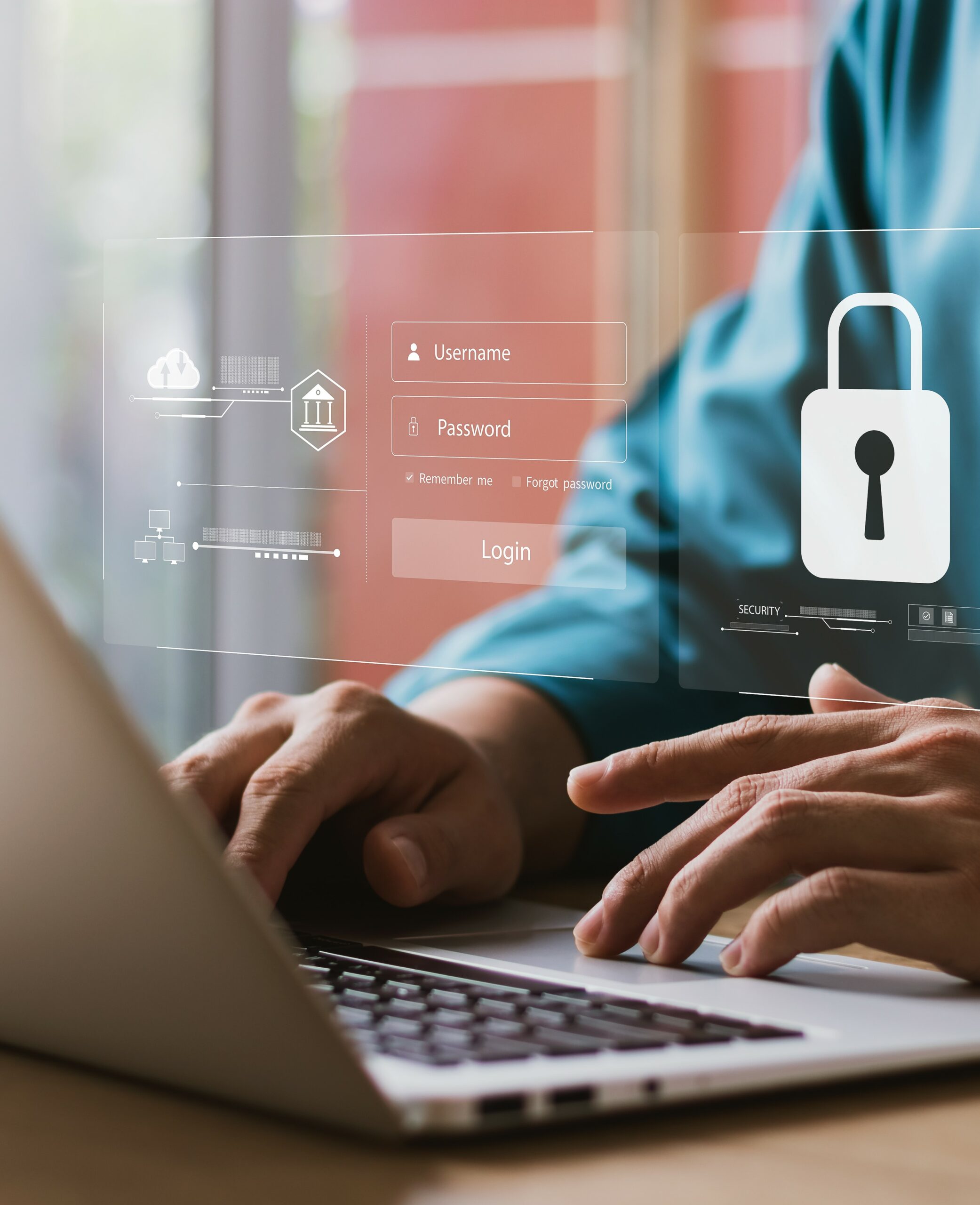How to secure communication channels from cyberattacks
The threat of cyberattacks and ransomware is a growing concern for businesses worldwide. As hackers become more sophisticated and their attacks become more frequent, it is essential for companies to prioritize the security of their sensitive data and processes.
In this comprehensive blog article, we will explore various crucial aspects of cybersecurity. We will particularly focus on how to secure communication channels from cyberattacks. Our aim is to assist you in safely navigating in the digital landscape and secure your communication through Clouds solutions. We will also provide you with hints on what to check in your VoIP system and VPN.
Additionally, we will introduce the key Sicherheit features of Rainbow, our cloud solution. In this article we will show how it emphasizes data sovereignty and European compliance for flexible communication and collaboration.

The rise of cyberattacks and the need for enhanced data security
The rise of cyberattacks can be linked to the increasing reliance on digital systems. Plus, it is also linked to the valuable data they contain within corporation infrastructures. Cyber hackers target organizations to gain unauthorized access to their digital ecosystem and infiltrate their sensitive processes. They are motivated by several factors, including financial gain, espionage, or disruption.
Their goal is to exploit vulnerabilities in corporate networks in order to steal sensitive data. They want to steal data such as customer information, intellectual property, financial records, or trade secrets.
Furthermore, cybercriminals can disrupt operations or demand ransoms through ransomware attacks, social engineering, phishing, spoofing etc. This often stems from multiple communication channels and a lack of understanding about securing communications.
Ignoring security protocols and using unauthorized, insecure resources heightens the risk of cyberattacks.
In the context of Bring Your Own Device (BYOD) policies, it is important to note that BYOD is acceptable when certain conditions are met. Specifically, your devices must be equipped with robust security agents such as EDR/XDR. The use of these devices must be formally reported to the Chief Information Security Officer (CISO) within your organization. This approach ensures that a sufficient level of security and protection is supported, even in the context of BYOD, fostering a safer computing environment.

Data breaches and leaks
As the trend of remote work continues to gain popularity and becomes more prevalent in our daily lives, it is important to acknowledge and address the growing concern of data breaches and leaks. Today, organizations rely heavily on technology for communication and productivity, the risks associated with unsecured Wi-Fi hotspots in public places and unsecured home internet connections have become more significant.
These weaknesses have created numerous access points that can potentially be exploited by cybercriminals, putting our sensitive information and digital assets at risk. Corporate PCs are actually used to prevent problems of connections in public/ home environment.
Data breaches and leaks primarily result from focused attacks, commencing with an initial phase called “reconnaissance”. This initial step involves gathering information from public or other open sources (e.g. OSINT) to gather related information on an organization that could be used by attackers. These pieces of information can be found on social media, can be linked to habits and to things that people might say in public places.
In summary, the need for improved data security is primarily due to employees’ lack of awareness. It is also linked to the failure to separate personal and professional work environments, which often leads to data leaks. It is also important to exercise caution when using social media. Sharing too much information, whether through social networks or other channels, can also result in the leakage of valuable information about an organization.

Best practices for cybersecurity
To protect your corporation from cyber threats, it is crucial to implement and follow practical guidelines that will reinforce your cybersecurity defenses.
- Make sure to not share your passwords on browsers
- Make sure that all employees receive regular cybersecurity training to recognize and respond to cyber threats effectively.
- Get robust, up-to-date antivirus and anti-malware software on all devices, and keep systems and software patched and updated.
- Use strong, unique passwords and implement multi-factor authentication whenever possible.
- When choosing a solution based on the Cloud, scrutinize its security measures, data encryption protocols, and vulnerability management.
- Regularly back up essential data and store backups offline to limit ransomware risks.
- Limit access permissions and use the principle of least privilege, ensuring employees have access only to what they need.
- Audit and monitor network activity for unusual behavior and have an incident response plan in place to act swiftly in case of a cyber-attack.
- Stay informed about evolving cyber threats and adapt your security measures accordingly.
Encrypted VoIP calls
Organizations need to ensure that not only the exchange of text messages, emails or all kinds of written communications should be secure, but also the telephony aspect of internet communication.
Indeed, it is essential to protect any kind of communication and voice conversations over the internet which must also be secured.
Concerning Voice over internet protocol (VoIP) calls, prioritizing encryption is crucial. Users should be aware that encrypted VoIP calls offer a secure shield against eavesdropping and data interception, ensuring the confidentiality of sensitive conversations. To make the right choice, opt for VoIP service providers that employ end-to-end encryption protocols, and use applications or platforms that prioritize security or encrypted VoIP features. By taking these proactive steps, you can bolster your digital defense and keep your conversations truly private.

Flexibility and VPN, is it compatible?
Organizations usually know the importance of using a Virtual Private Network (VPNs) for securing their data and their communications. It is also essential to consider their flexibility and adequacy for diverse needs.
VPN’s users should always challenge their VPN’s asking, “Is this VPN flexible enough to accommodate to the full spectrum of our organization’s requirements?”
VPNs protect remote work data but may not suit all digital infrastructure. It is also important to check if your VPN aligns with your scalability, performance wishes and the varied technology system. Questioning your VPN on these problematics will help identify your organizations’ needs, especially in the context of remote working and beyond.

Ensuring Data sovereignty and Compliance
Reviewing certifications and compliance is crucial for data security and reducing cyberattack risks.
Non-compliance with General Data Protection Regulation (GDPR) and the Health Insurance Portability and Accountability Act (HIPAA) can result in severe penalties. Businesses must align communication security with GDPR and HIPAA. Prioritizing compliance safeguards data and enhances reputationn and trustworthiness.
In terms of security and certifications, Rainbow takes several robust measures to ensure the fullest protection of its users’ data. The Rainbow solution is independent of any non-sovereign Act.
By doing this, the platform maintains a high level of data integrity and sovereignty. This ensures all data and exchanges on the platform remain shielded from external interference.
The frequency of cyberattacks in today’s digital landscape highlights the crucial importance of robust cybersecurity measures for corporations. When corporations utilize Cloud solutions, they should carefully consider the security measures implemented in their design. For example, corporations must assess their cloud providers’ compliance, certifications, and security to safeguard data from emerging threats.
Our cloud solution, Rainbow, emerges as the ideal answer to secure your communications.
Rainbow Edge is the solution for companies seeking to enhance collaboration and communication and achieve seamless teamwork within their teams while ensuring the security of their sensitive data on their own infrastructure.




